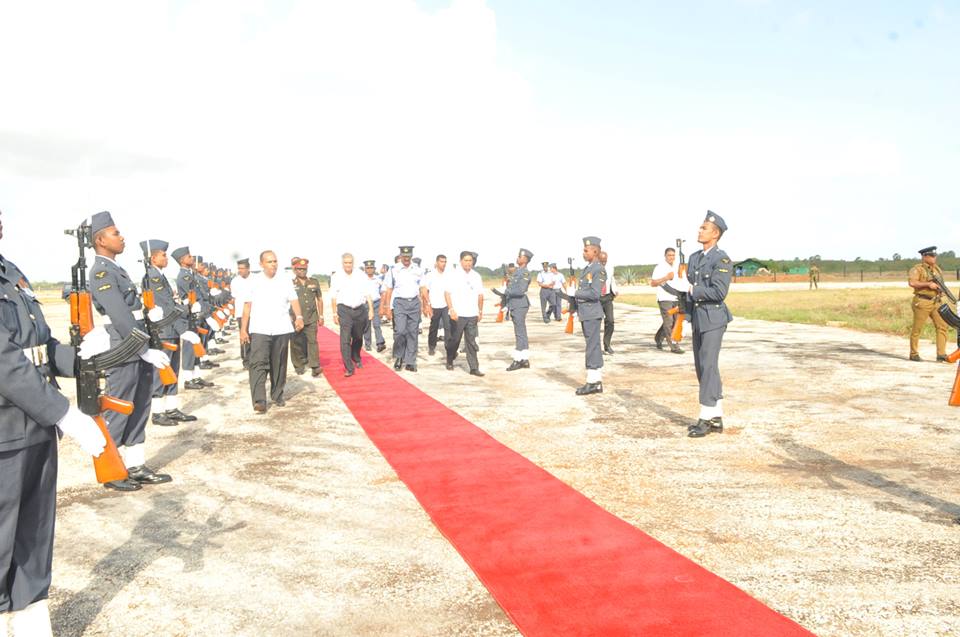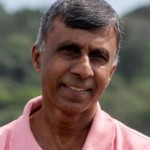A Brief Colonial History Of Ceylon(SriLanka)
Sri Lanka: One Island Two Nations
A Brief Colonial History Of Ceylon(SriLanka)
Sri Lanka: One Island Two Nations
(Full Story)
Search This Blog
Back to 500BC.
==========================
Thiranjala Weerasinghe sj.- One Island Two Nations
?????????????????????????????????????????????????Tuesday, March 31, 2015
Prime Minister’s Visit To Jaffna & The 13A
Much acclaimed three day visit of the Prime Minister, Ranil Wickremesinghe,
to Jaffna and the Northern Province has, in my opinion, raised a
substantial issue with regard to good governance. This visit happened
immediately after the troika’s (President Maithripala Sirisena, the Prime Minister Ranil Wickremesinghe and the former President Chandrika Bandaranaike)
visit to Jaffna to attend the ceremony of handing over of 425 acres of
land owned by the people in Kankasanturai, Myleddy and Palaly. Although
this was, as I reiterated in this column, a much delayed exercise, the
new government should be commended at least for taking first step in
resettling people in their own land from which they were forcefully
displaced for 30 years. We believe the rest of the land in Jaffna and
Sampur will be handed over to their legal owners in the due course
without much delay. Handing over ceremony was well attended and the
dignitaries included the President Maithripala Sirisena, the Prime
Minister Ranil Wickremesinghe and the former President Chandrika
Bandaranaike together with the Chief Minister of the Northern Province, C. V. Wigneswaran.
What we had witnessed in the subsequent three day visit of the Prime
Minister was a conspicuous absence of the Chief Minister of the Northern
Province in any of the newspaper frames published in the Colombo
newspapers.
 It
was not clear why the CM and the Provincial Council members of the NPC
were absent in any of the meetings attended by the PM. Was it because
they were not invited by the PM’s office? Or was it because they decided
to boycott those meetings following the remarks made by the PM over an
Indian TV channel? NPC sources said the invitation sent to the Council
on the Prime Minister’s visit was “not properly delivered”. However, a
couple of weeks ago, the Prime Minister, Ranil Wickremesinghe was
reported to have said that “I don’t discuss Jaffna with Wigneswaran. I
discuss with the TNA in Parliament.” He also said that he would not talk
to the CM when he visits Jaffna. However, it is interesting to note
that the TNA parliamentarians were present at the meeting. The Secretary
General of TNA, Mavai Senathirajah, spokesman Suresh Premachandran and
E. Saravanabavan participated in the functions attended by the PM.
It
was not clear why the CM and the Provincial Council members of the NPC
were absent in any of the meetings attended by the PM. Was it because
they were not invited by the PM’s office? Or was it because they decided
to boycott those meetings following the remarks made by the PM over an
Indian TV channel? NPC sources said the invitation sent to the Council
on the Prime Minister’s visit was “not properly delivered”. However, a
couple of weeks ago, the Prime Minister, Ranil Wickremesinghe was
reported to have said that “I don’t discuss Jaffna with Wigneswaran. I
discuss with the TNA in Parliament.” He also said that he would not talk
to the CM when he visits Jaffna. However, it is interesting to note
that the TNA parliamentarians were present at the meeting. The Secretary
General of TNA, Mavai Senathirajah, spokesman Suresh Premachandran and
E. Saravanabavan participated in the functions attended by the PM.
The issue that I seek to raise in this article is of fundamental nature
and not about the technicality of the invitation procedure. Commenting
on the absence of the CM and NPC members, Minister Maheswaran said Chief
Minister Wigneswaran and the NPC Councillors should not have snubbed
Wickremesinghe as the purpose of the visit was to address the
humanitarian issues in the North. This statement and the statement
previously made by the Prime Minister demonstrates the total
misunderstanding on the issue of devolution and the arrogant attitudes
of the center politicians. The UPFA government introduced and
implemented uthuru wasanthaya (Northern
Spring) program as a step to reconstruct the war-torn area. Of course
the program had many structural weaknesses such as over emphasis and
prioritizing big infra-structure program while neglecting small
irrigation, village roads etc. Notwithstanding these weaknesses one of
the principal drawbacks of the uthuru wasanthaya was that it
was designed to implement by the central government. Prime Minister and
the Minister Maheswaran should know that if the intention is to address
humanitarian issues, what is needed is not the mere participation of the
NPC but the full responsibility of implementing them by the NPC. If the
Prime Minister thinks that he can address the issues in the Northern
Province by talking to the TNA members marginalizing and sidelining the
elected NPC and its Chief Minister, I would submit that he is making the
same error what the previous UPFA government arrogantly did. It is
imperative to note many of the issues that he sought to address in his
three days visit are devolved subjects or the subjects in the concurrent
list.
Northern Province has always had special relationship with Colombo even in colonial days. A former GA to Jaffna, Neville Jayaweera in his book mingling
history with insights informed us one aspect of this special
relationship. He writes: “I said that one of the duties of the GA Jaffna
was to receive visiting High Commissioners and Ambassadors in his
office or Residency. It was a convention special to Jaffna, from a long
way back, and did not normally devolve on the GAs of other districts. I
believe the convention was established from as far back as the mid
1880s, long before even Colombo had any foreign embassies on its soil.”
He added: “I believe that this convention was later endorsed by the
Ministry of Defence and External Affairs because of sensitive political
circumstances prevailing in Jaffna”. (Jaffna Exorcising The Past and Holding the Vision: An Autobiographical Reflection on the Ethnic Conflict)Conventions
are often times stronger than laws. This specificity of Jaffna and the
North suggests that some kind of constitutional asymmetry has to be
introduced and well respected in implementing the 13th Amendment until new constitutional design is agreed upon.
The Government in Colombo has always attempted to weaken the 13th Amendment
by changing laws, using lacunas in the Amendment and mere using powers
of the central government. Hence, the chief administrative officer of
the province, the Provincial Secretary has been sidelined since the late
1980s giving more powers to the GAs who come under the central
government. It appears that the Prime Minister Ranil Wickremesinghe in
his three days visit to Jaffna and the North adopted the same practice.
It is necessary to add that such a practice based on supremacy,
arrogance, and authority has nothing to do with good governance. Ending
his three day visit to north, the Prime Minister revealed that he would
appoint a special officer from the prime minister’s office to look after
the North. This begs a question. What is devolution for? What is the
special capacity and capability the PM’s office has over the CM’s
administrative mechanism to govern the north?
*The writer is the Dean, Faculty of Management and Finance, SANASA Institute of Business and Development Studies – e-mail: sumane_l@yahoo.com


